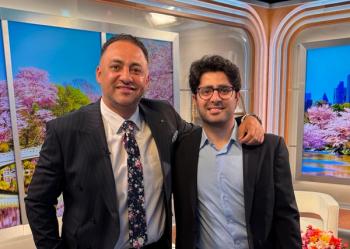
A Pine Tar Affair
My introduction to the works of Dr Z followed shortly AFTER my own humiliation. My patient had just stormed out of the interview and informed me that I would never pass the medical boards with my apparently egregious neglect of her needs. My supervisor gave me a smile and said, “You might have done better if you approached the patient like Dr Z suggests.
My introduction to the works of Dr Z followed shortly AFTER my own humiliation. My patient had just stormed out of the interview and informed me that I would never pass the medical boards with my apparently egregious neglect of her needs. My supervisor gave me a smile and said, “You might have done better if you approached the patient like Dr Z suggests. You could have said to your patient: ‘you have every reason to be upset. . . let’s try and figure out how we can fix things together.’” He then handed me a beat-up paperback copy of Dr Z’s first book--that he still keeps with him as a back-pocket bible-- and recommended I study it.
I devoured the book, captivated by the beautiful way it articulated the role of language in psychotherapy and the complexities of therapeutic alliance formation. Months later, while applying for residency programs in psychiatry, I met a nationally renowned psychopharmacologist who sadly told me how Dr Z-an individual whom he credits as one of his greatest teachers-had become quite debilitated and could no longer practice. And though it now seemed that I would never have Dr Z as a supervisor or even meet him, I continued to study his teachings and to be greatly influenced by his masterful approach to psychotherapy.
While a psychiatry resident on an inpatient unit, I met a former patient of Dr Z’s. She was a woman in her late 50s with severe depression who was initially admitted to our inpatient unit because of concerns that she was unable to care for herself. She told me of her many hospitalizations and the medication trials she had undergone in her early 20s, followed by nearly 30 years of stability. She had had a successful career and many meaningful relationships. But she began an abrupt downward spiral 2 years before her current hospitalization-her first since the late 1970s.
In our initial interview, she offered an answer to my most pressing question. She said, “I was able to keep it together and I didn’t even need medications because I had the best psychiatrist in the world-Dr Z. And then my life pretty much collapsed as soon as he got too old to be my doctor.” Here was validation that in both his writings and practice, Dr Z was able to skillfully treat the most complicated patients.
Then she nearly broke my heart. She told me that Dr Z had hugged her multiple times and told her that he loved her. No, they were never sexually intimate and they never kissed. Still, I was shocked that my psychotherapeutic hero could be guilty of what I thought was blatantly taboo behavior. In a way it reminded me of the moment when Congressional hearings proved that all of my previously idealized baseball sluggers had used anabolic steroids. It took all my strength to summon a smile and end the session in a professional manner.
When I next sat down with the treatment team, I was compelled to disclose my great sadness of having suddenly discovered the all-too-human imperfections of Dr Z. However, my attending-also a big fan of Dr Z-provided quite an optimistic perspective, “Think about it like this: he took one of the most severely depressed and complicated patients we’ve encountered up here in a while and guided her through life without any hospitalizations or psychopharmacological interventions for more than 20 years! If that isn’t masterful psychotherapy, then what is?”
No matter the discipline, virtuosos push the limits of acceptable practice, and our field is certainly no exception. Did it really matter that Muhammad Ali used the rope-a-dope strategy to beat George Foreman in the Rumble in the Jungle? And wasn’t Carl Jung famously rumored to have sung lullabies to patients who had intractable insomnia, a maneuver that would likely require some serious explanation from any psychiatricy resident in training today?
Perhaps what this whole experience best illustrates is how we are forever trudging through the ill-defined mires of therapy: somewhere in between strict observance of patient-therapist boundaries and the necessity of using what may be unorthodox methods to heal our patients. This is even more confusing when we recognize that our specific discipline within medicine is perhaps the last “gray science”-even with the thousand-patient data sets from CATIE and STAR-D, the growing research using functional MRI, and the impending arrival of DSM-5. As residents, we must still seek out the non–evidence-based clinical pearls of our seasoned mentors to shed light on our most challenging diagnostic and therapeutic dilemmas.
My encounter with Dr Z’s patient reminded me of yet another possible baseball analogy: the
As psychiatry residents, we are similarly cast as rookie umpires: struggling to rule on the fine line between a therapeutic alliance and a foul ball. And while I can’t tell you the career statistics of George Brett and I don’t know what happened to him after he retired from professional baseball, I know that he hit a home run against the Yankees, pine tar be damned.
Therefore, I will continue to hold Dr Z in high regard for both his wise insights into psychiatric interviewing and for his masterful--albeit perhaps at times unconventional--skills as a clinician.
Acknowledgement-The author would like to thank Dr Michael Kahn and Dr Cristinel Coconcea of Beth Israel Deaconess Medical Center for their mentoring.
Newsletter
Receive trusted psychiatric news, expert analysis, and clinical insights — subscribe today to support your practice and your patients.







